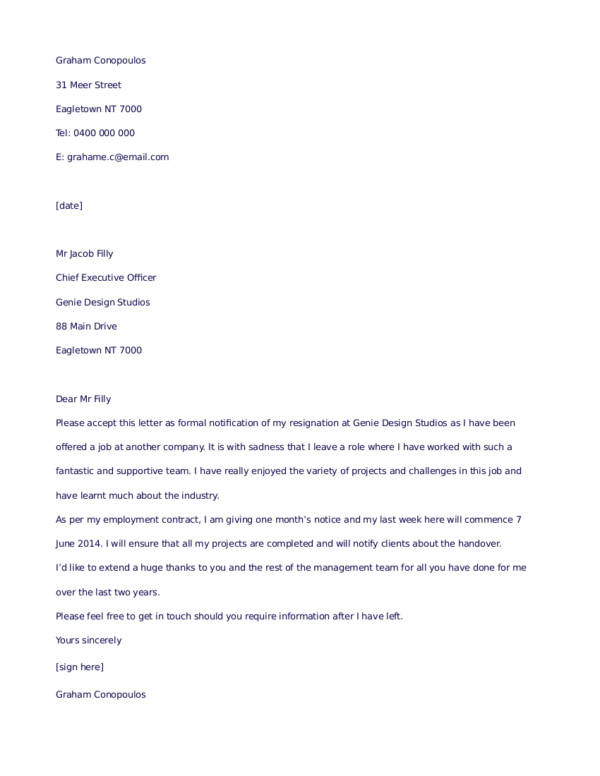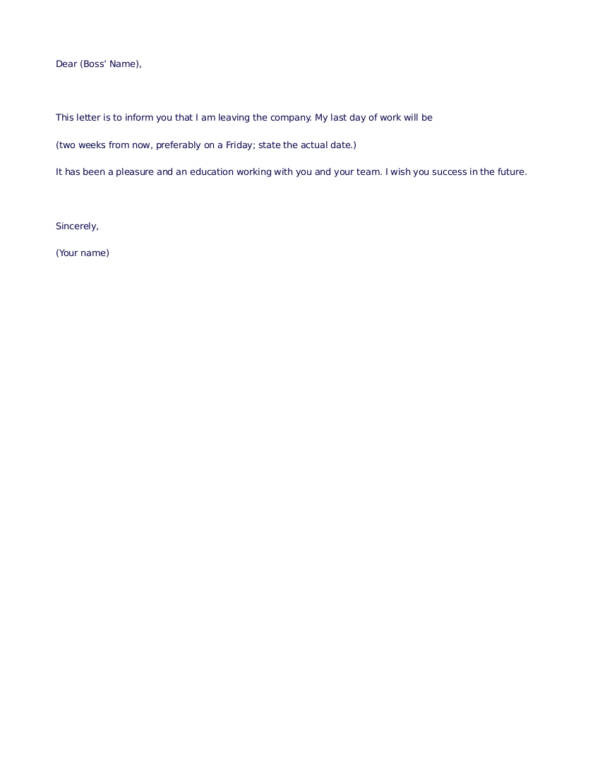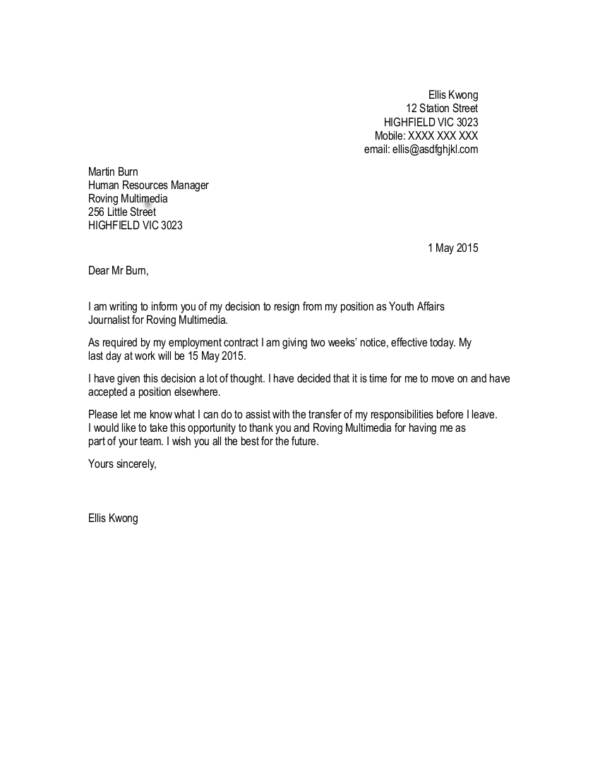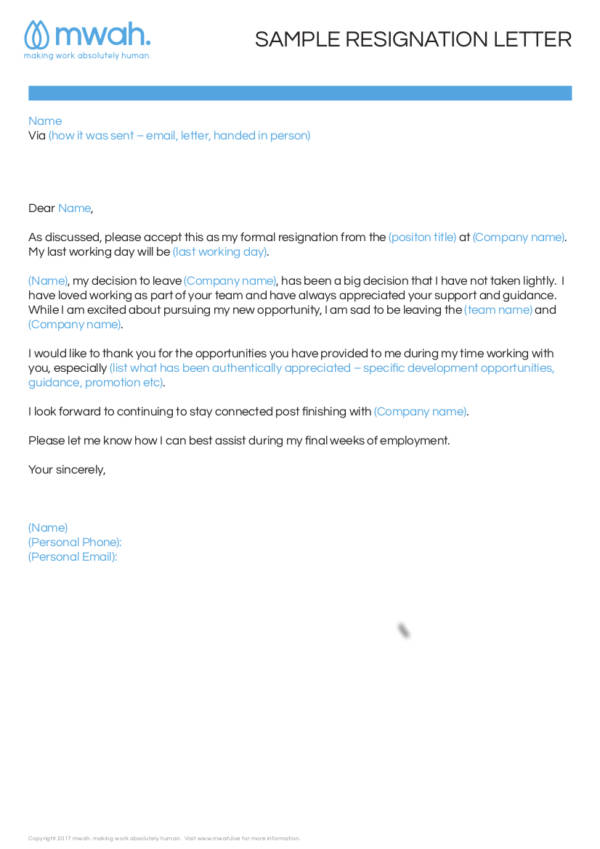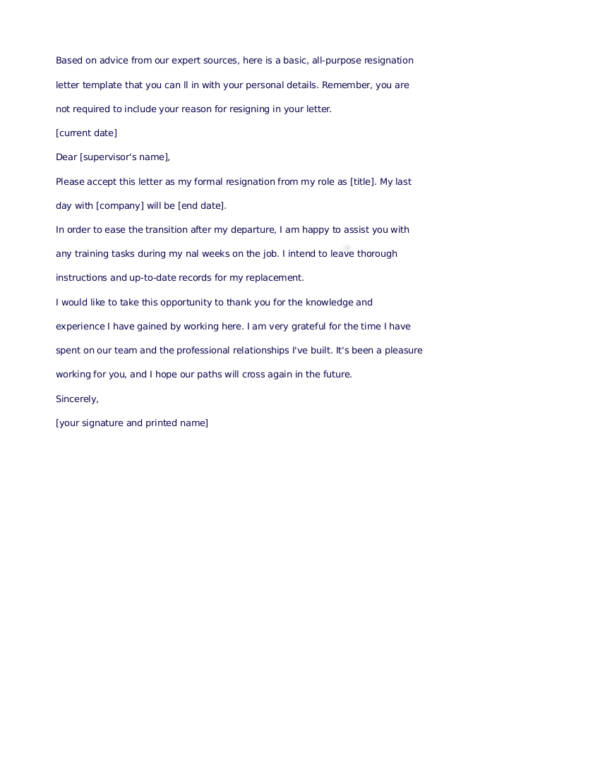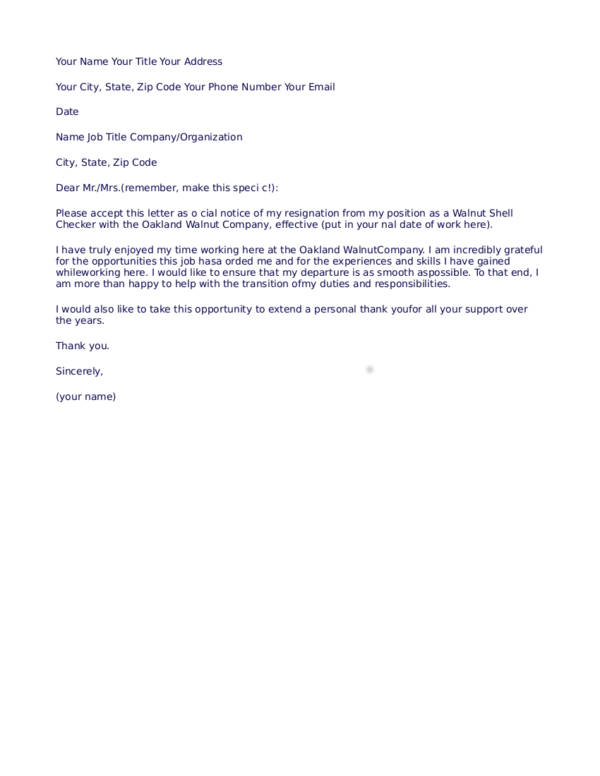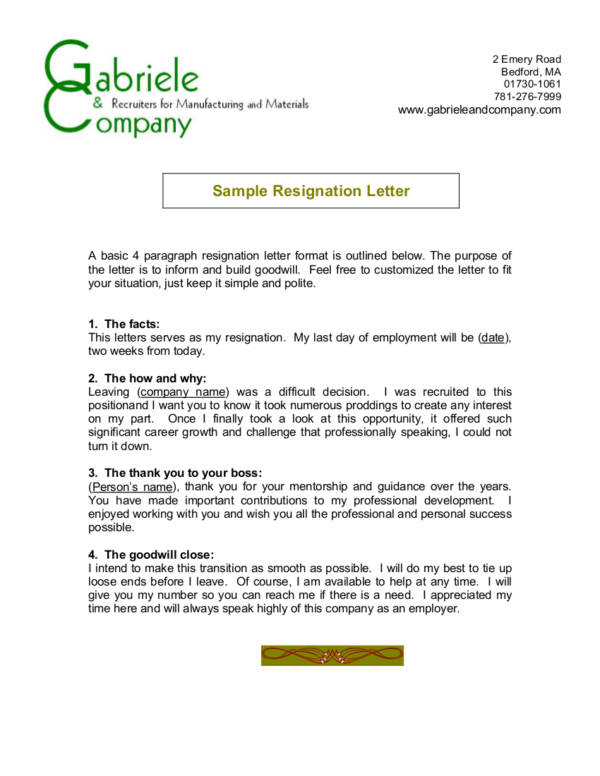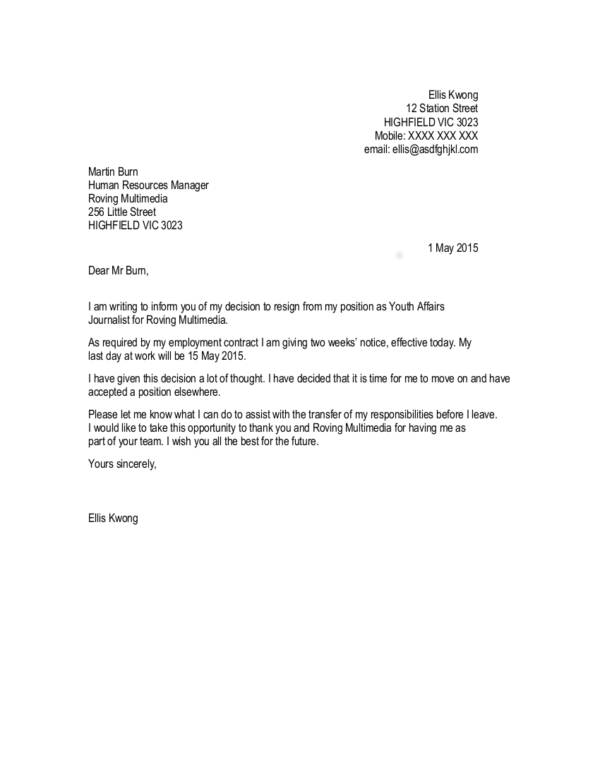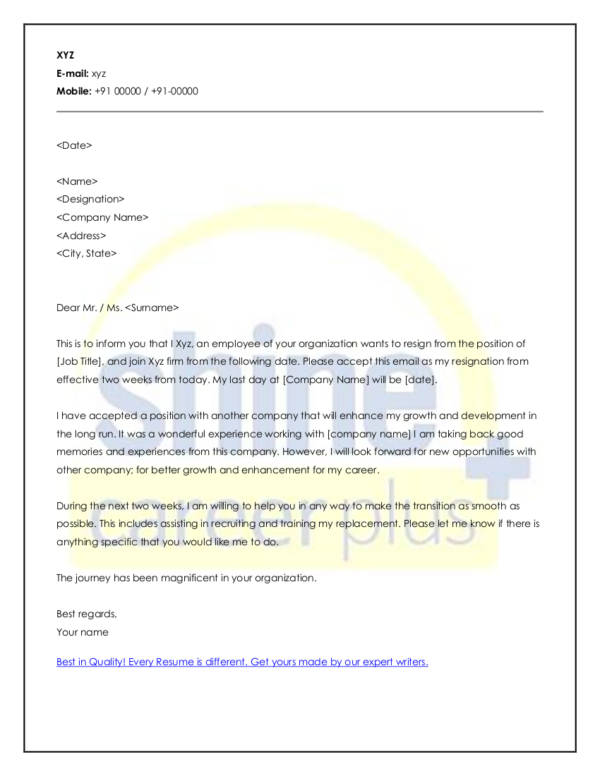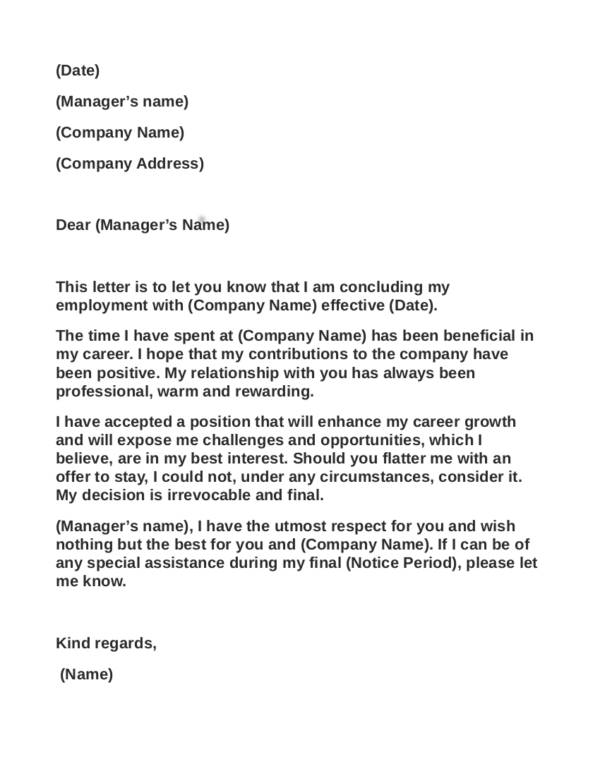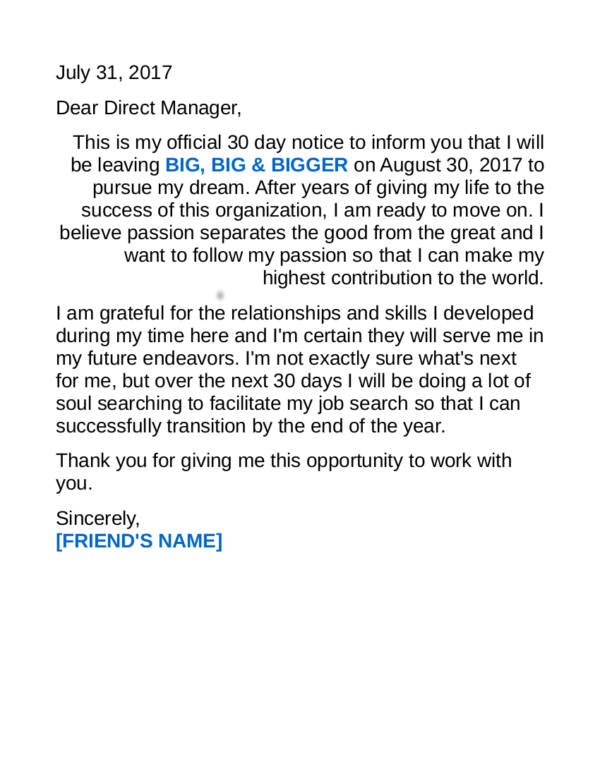Have you finally landed yourself a job offer that smells of a sweet and promising future? That’s great for you! Now you are faced with the problem of having to notify your current boss of your decision to resign. You don’t have to find this task difficult as long as you know the proper way to resign from your job peacefully. We are here to give you some helpful tips for proper resignation. After reading the tips, you may use our resignation letter templates as your reference.
Appreciative Resignation Letter
Resignation Letter for Personal Reasons
Resignation Letter with Notice Period
Thankful Resignation Letter
Talk to Your Boss Personally
Your boss or your immediate head must be the first one in the company to know about your decision to resign. You don’t want your boss to learn of your resignation through the grapevine. It is entirely unethical should you tell your colleagues about your decision to resign before telling your boss. It is your boss who must first be notified so that they can take the appropriate steps that must be done after your resignation such as looking for a replacement and training a replacement.
Ask for a Meeting with Your Boss
Since most managers and employers are such busybodies, you have to schedule an appointment with them ahead of time. Don’t expect them to simply drop their tasks in order to insert you in their calendar; you have to be patient and plan ahead that your remaining time in your current company is enough to anticipate possible delays when it comes to notifying your bosses properly. During the meeting, remain polite and provide your boss with a proper reason for resignation. At all costs, avoid expressing anger. Don’t blame your boss for your resignation. In fact, even if you may have a problem with the management, you better keep it to yourself. Your initial verbal notification to your boss is not the proper avenue for airing your complaints against the company.
Anticipate Your Boss’s Response
Don’t expect your boss to accept your news with a smile and open arms. You have to empathize with them as well that they may be saddened by the thought of losing an employee. When they lose an employee, they might think that their business operations would be disrupted. Other than the fact that your boss may not be happy with your decision, you must also be prepared for a counteroffer. While it may not be all the time that bosses would give a counteroffer, however, if you are a promising employee then there’s a chance that your boss may want to keep you by trying to convince you to stay. It is understandable that you won’t be able to make a decision whether to accept a counteroffer or not before knowing its terms, it is always wise for you to mentally prepare yourself of a possible counteroffer. To do so, remember the reason why you are quitting. Assess the consequences of you staying should you accept a counteroffer.
Remember the Reason Why You Are Quitting
During your remaining days in your company, you may feel a bit sentimental about leaving your workplace behind. However, do not let this distract you from the main reason why you have decided to leave in the first place.
Prepare Yourself for a Possible Exit Interview
An exit interview is a short interview to be conducted by a human resource staff or manager. During this interview, there may be questions wherein you would be asked to give input regarding the company and its practices. When answering the exit interview questions, you must avoid blaming or criticizing the company, its managers, or its practices just for the heck of it. If you must criticize something, make sure that you are able to do so in a constructive manner by offering solutions. Speaking of exit interviews, you won’t have to discuss all the details of your new job or your new company. It is enough that you are able to inform your boss the reason for your resignation.
Resignation Letter for a Job
Thank-You Resignation Letter
Generic Resignation Letter Sample
Two Weeks Notice Period Resignation Letter
Simple Letter of Resignation
Keep Working as Usual
Even in your last week or days in the company, you have to keep on working efficiently just like in any other day. Remember that you are still getting paid to work and it is your obligation to deliver the results that are expected of you. You are expected to perform your job functions up to your last minute of employment in the workplace. That’s why you have to work hard and keep on hitting deadlines and accomplishing tasks and goals.
Be Helpful During the Transition Period
As mentioned, you have to offer your help during the transition period. It would benefit you greatly down the road if you save your boss the hassle of having to deal with your replacement alone. As much as you can, you have to prepare a turnover file that contains all the instructions on how your replacement can properly and effectively perform his/her tasks. If you are involved in an unfinished project, you may hand him/her a list of tasks that must be accomplished. Provide deadlines and a time schedule so that your replacement can manage his/her tasks properly according to its importance.
Resignation Letter with Notice Period
Final Resignation Letter
30 Days Notice Period Resignation Letter
Write a Resignation Letter
After you have informed your boss verbally, you may proceed to the next step, which is the most important step of all—writing a formal resignation letter. Observe the proper format of resignation letters. If you need any refresher on how to format a resignation letter, check out our templates on this page. When it comes to writing the body of your resignation letter, here are some time-tested rules you can follow:
- Always start your letter with a short and warm greeting.
- After the greeting, state your intention to resign while specifying the date when your resignation would take effect.
- As much as you can, observe the proper notice period that your company requires of you. If you can’t render a lengthy notice period, you can at least observe the standard two weeks notice.
- State your willingness to help your boss during the transition period by helping him/her find a replacement for you. It would also help your boss feel at ease if you would assure him/her that you would perform a proper turnover of tasks and documents to your replacement.
- Express your gratefulness to your boss. Count all the learnings you have acquired from your experiences in the company. You must be genuinely thankful, otherwise, it is best to leave this part.
- Always maintain your politeness throughout the letter by avoiding expletives, name-calling, and any spiteful or sarcastic remarks.
- Close your letter formally and don’t forget to sign off your name and affix your signature.
Send Your Resignation Letter
It is a standard rule that resignation letters be sent after the verbal notification. You must send your letter at the earliest time possible. Now you might be wondering, why bother sending a resignation letter when you have already verbally notified your employer? The answer lies in the fact that you are in a professional setting and in this setting, formality and documentation are two of the most important things. When sending your resignation letter, make sure that you choose a mode that makes it more convenient for your boss to read it—whether it’s hand-carry or via e-mail.
Thank Your Boss
When all is said and done and you have finally packed all your things in the office in one tiny box, don’t forget to thank your boss personally. You may simply wave goodbye if they are too busy to see you out. It is best to end things on a positive note so that you can avoid burning bridges unnecessarily. You may need your boss or managers to write a recommendation letter on your behalf in the future, so don’t be in a hurry to cut all ties with them yet.
Tell Your Coworkers
Lastly, you must also notify your coworkers about your resignation. You can only do this after you have notified your boss and subsequently handed in your resignation letter. Avoid telling your coworkers before your boss as this may cause a rift between you and the management due to the inherent lack of propriety of such action. Tell your coworkers the same reason for resignation that you have told your boss in the meeting and in the resignation letter. Consistency is important when it comes to these things because you would be pegged as a liar or unprofessional if you are not consistent with what you say.
That’s it! If you follow these simple tips, then you are sure to resign the proper way. We hope that you may be able to apply these tips, which are designed to help you maintain a professional and respectable reputation within your company even after you left it. The shape of your reputation is crucial to the determination of how your career would flow, so you have to protect it all the time. Also, don’t forget to enjoy the new career adventures that await you in your future endeavors!
Related Posts
Resignation Letter for Medical Samples & Templates
Letter of Intent Samples & Templates
Letter of Intent for a Job Samples & Templates
Lease Proposal Letter Samples & Templates
Letter of Inquiry Samples & Templates
Character Reference Letter Samples & Templates
Claims Letter Samples & Templates
Response Letter Sample & Templates
Follow Up Letter Samples & Templates
Sample Project Proposal Letter Templates
Donation Letter Samples & Templates
Addressing a Formal Letter Samples & Templates
Grievance Letter Samples & Templates
Sample Sponsor Thank You Letter Templates
Sample Letters of Request

